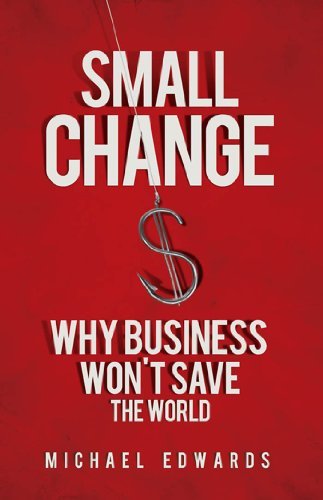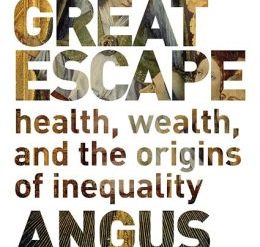
Small Change: Why Business Won’t Save the World should be required reading for every foundation board member and program officer, every major donor—in fact, philanthropists of any description. In this tiny volume, Michael Edwards lays bare the fatal flaws in the philanthropic world in America today and offers a prescription for healing the field that could play a major role in putting our country back on track to leading with its values.
Estimated reading time: 5 minutes
Critiquing American philanthropy
Oddly enough, Edwards did not set out to write a critique of American philanthropy. The book is subtitled Why Business Won’t Save the World, and the author’s stated objective was to explain why. He proposed to debate the dubious claims of the “philanthrocapitalism” espoused by The Economist’s Michael Bishop and others, the “creative capitalism” offered by Bill Gates, the “fortune at the bottom of the pyramid” of C. K. Prahalad, “corporate social responsibility” of the window-dressing variety, and “social enterprise” in virtually all its guises. His goal, in short, was to reject the role of business, business thinking, and the market as solutions for the ills of the nonprofit sector. All that comes across clearly enough, but the message that comes through more clearly is that philanthropy in America today is in urgent need of rethinking.
Small Change: Why Business Won’t Save the World by Michael Edwards ★★★★★

Michael Edwards is brilliant, articulate, and extremely knowledgeable about philanthropy, civil society, and social change, all of which are major themes in this book. For nearly ten years, he directed the Ford Foundation’s Governance and Civil Society Program, and he has spent more than three decades in the nonprofit sector. On matters involving business he is less sure-footed. In the course of writing this book, he conducted extensive research on the role of business and business thinking in the not-for-profit world. That research shows clearly in Edwards’ eloquent critique of philanthropy that either comes directly from corporate sources or is guided by the metrics-driven methodologies of the business world. He is on shakier ground when writing about social enterprise, which he mistakenly appears to believe is dominated by profit-seeking companies.
Social enterprise is hard to define
“Social enterprise” is, of course, a fuzzy term, and ultimately its definition lies in the eyes of the beholder. However, there’s no disputing the fact that a huge proportion of social change efforts undertaken under that umbrella are, in fact, nonprofits—many of them engaged in the sort of bottoms-up, grassroots organizing efforts that win Edwards’ praise. Apparently believing otherwise, he dismisses the world-changing work of Ashoka‘s more than 3,500 social entrepreneurs in 95 countries around the world.
Unlike the true “philanthrocapitalists” who are imposing top-down approaches and burdensome measurement and reporting requirements on so many of the nonprofits they support, Ashoka Fellows are achieving impact not just in the communities where they work but on a nationwide scale, through the many policy changes that have resulted from their efforts. And Ashoka is just the most far-ranging and largest-scale of many, many efforts undertaken by social entrepreneurs around the world.
Philanthropy should foster social change
Edwards believes the authentic role of philanthropy is to foster transformative social change—change that addresses society’s injustices and inequities in fundamental ways. (I agree!) “No lasting change has been successful,” he writes, “without large numbers of people acting consciously and collectively around human values of solidarity and social justice, not market values. Markets are a great way to do some things, but not to fashion communities of caring and compassion.” While it’s true that “business won’t save the world,” the only force that seems to me capable of doing so is social enterprise. Mainstream philanthropy seems intent on doing everything but effecting social change.
Perhaps, then, you can see why most of the people who should read this book undoubtedly won’t. Read it yourself, though, if you want to gain a truly insightful perspective on the world of philanthropy today.
About the author

MIchael Edwards was born in Liverpool, England, in 1957. Based on a storied career spanning major posts in the Ford Foundation, Demos, Save the Children, Oxfam, and the World Bank, he has written widely on civil society, philanthropy and social transformation. He is the author or coauthor of twelve books. He lives in upstate New York.
For related reading
This is one of the books I’ve included in my post, Gaining a global perspective on the world around us.
Like to read books about business? Check out My 10 favorite books about business history.
If you enjoy reading nonfiction in general, you might also enjoy:
- Science explained in 10 excellent popular books
- 10 great biographies
- Top 10 nonfiction books about politics
And you can always find my most popular reviews, and the most recent ones, on the Home Page.

























